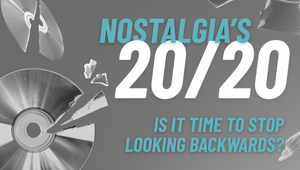
Marketers, Stop Chickening Out on Climate

Earlier this year, I explored 'greenlaughing', how humour can help cut through in sustainability communications. But the bigger threat now isn’t about how we talk. It’s that too many brands have stopped talking at all.
A couple of years ago, headlines about greenwashing were everywhere, from ASA rulings to high-profile brand investigations. Instances of greenwashing rose 35% year-on-year in 2023, according to ESG data researcher RepRisk, prompting regulators like the UK’s Competition and Markets Authority to make tackling it a top priority. The result was a necessary reckoning: brands had to back their sustainability claims with substance.
But that reckoning has created an equally risky side-effect, 'greenhushing'. It’s when brands choose to stay quiet about legitimate sustainability initiatives out of fear of scrutiny or backlash. According to the Chartered Institute of Marketing, over half of UK marketers feel wary of working on sustainability campaigns because they’re concerned about being accused of greenwashing. A 2024 report from climate consultancy South Pole found 58% of companies are actively cutting back on sustainability-related communications, a trend spanning every major industry.
The shift isn’t hard to understand. The political mood has changed, with net-zero targets facing open attack. Tory leader Kemi Badenoch has called the UK’s 2050 goal “impossible” without bankrupting the country, and in the US, Donald Trump has already signalled his intent to exit the Paris Agreement again. Add in a growing sustainability skills gap in marketing teams, and the temptation to quietly park climate messaging is strong.
But silence is not a neutral act. The latest Ad Net Zero and Kantar study analysed 6,500 ads worldwide and found just 6% featured sustainable behaviours, even subtly in the background. That’s not just a missed opportunity – it’s a step backwards. When companies under-communicate environmental efforts, it stifles collective progress, weakens accountability, and removes the competitive pressure that drives industry-wide improvement.
The “perception gap” makes this even more damaging. Climate Barometer polling shows half of MPs underestimate public support for net-zero, but the appetite is there, from consumers and employees alike. Kantar’s BrandZ data reveals that sustainability now accounts for 45% of a brand’s corporate reputation. The case is simple: when brands talk about sustainability in the right way, it can help them grow, build a stronger reputation, and earn real trust.
So, how do brands talk about sustainability without falling into the greenwashing trap?
Start with the proof. Talk about what you’ve actually done, not just what you hope to do. Patagonia’s 'Worn Wear' initiative is a strong example; their storytelling is inseparable from the initiatives themselves, making the message both authentic and undeniable.
Second, embed it culturally. At Born Social, we’re working with Ford to make electric vehicles more culturally relevant, weaving sustainability into campaigns from the outset rather than bolting it on. It’s about making sustainable behaviours part of everyday conversation, not an occasional corporate announcement.
Third, normalise it in the background. Not every piece of work can lead to sustainability, but initiatives like Ad Net Zero’s “Make Every Brief Count” show how even implicit signals, such as depicting more plant-based food or refillable products, can help embed sustainable choices in culture by normalising them.
And don’t wait until it’s perfect. Be open about the wins, and just as open about what still needs work. Lego’s 2023 update that it was dropping plans to make bricks from recycled plastic bottles, after finding the switch would actually increase total carbon emissions, was met with respect, not ridicule. It showed honesty and a genuine commitment to getting it right.
The temptation to greenhush is understandable. But for brands serious about impact and staying relevant, silence isn’t safety; it’s surrender. Consumers want to hear about what you’re doing. Competitors need the nudge to keep up. And the planet doesn’t have time for us to keep quiet.
Now is the moment to turn the volume back up.















